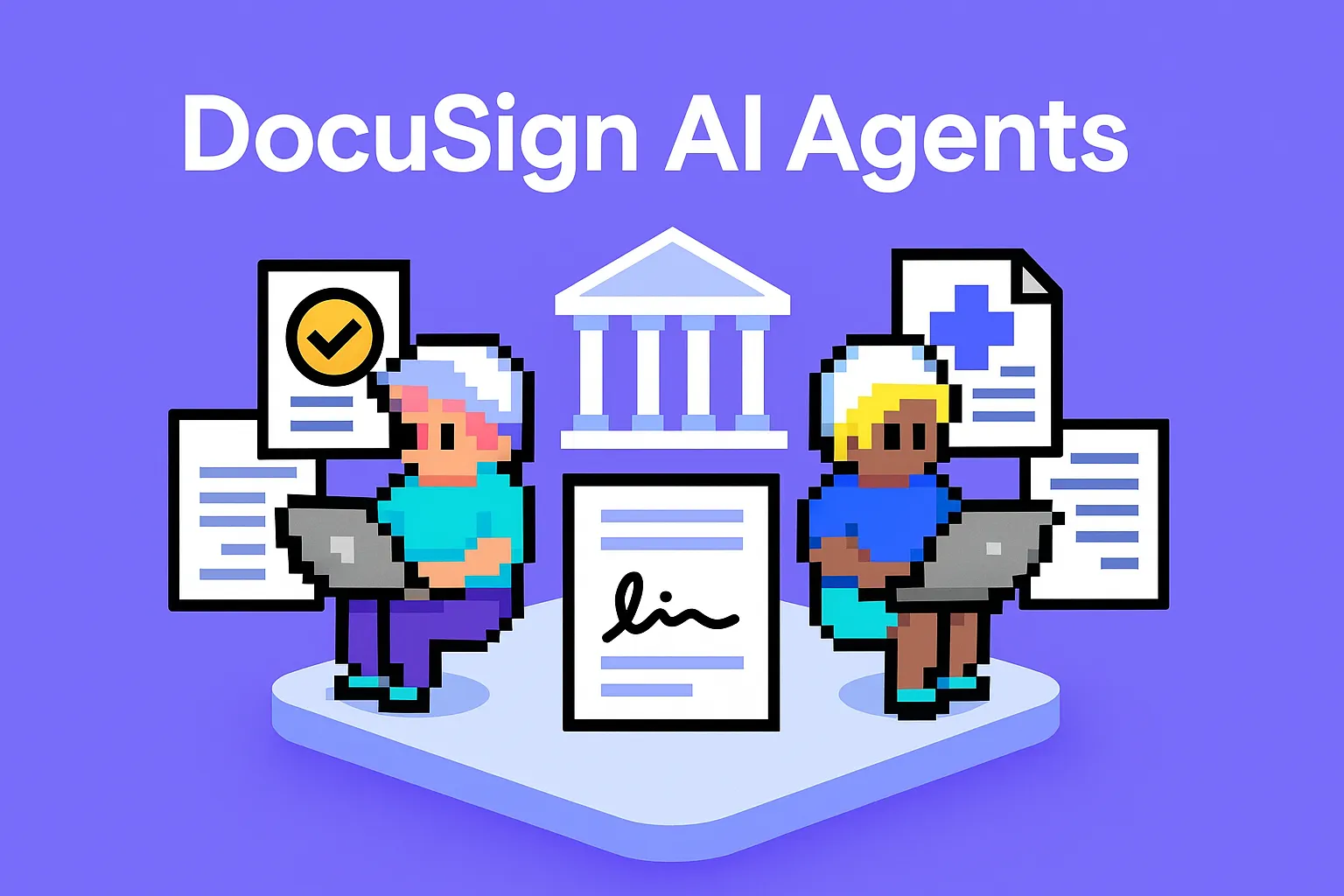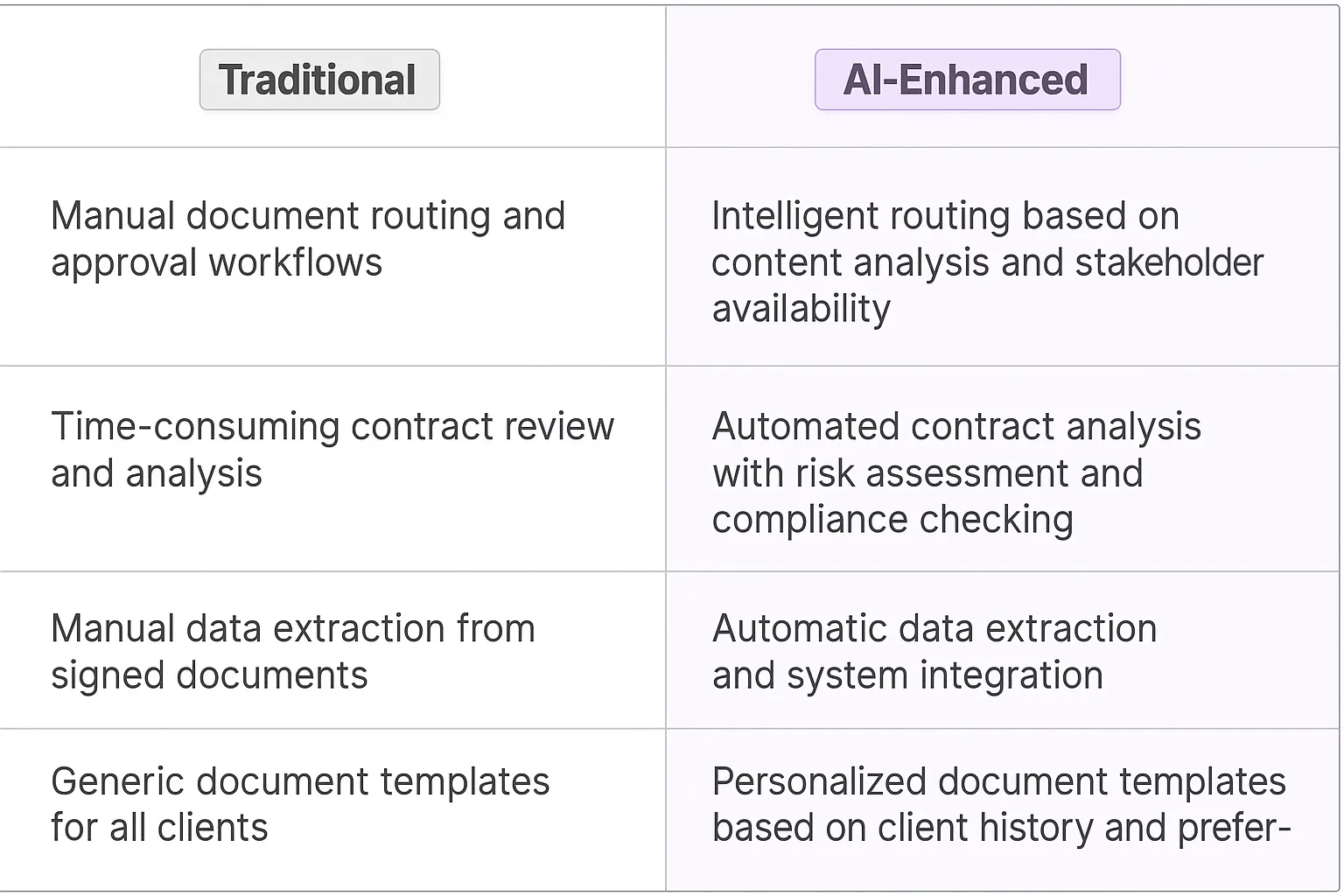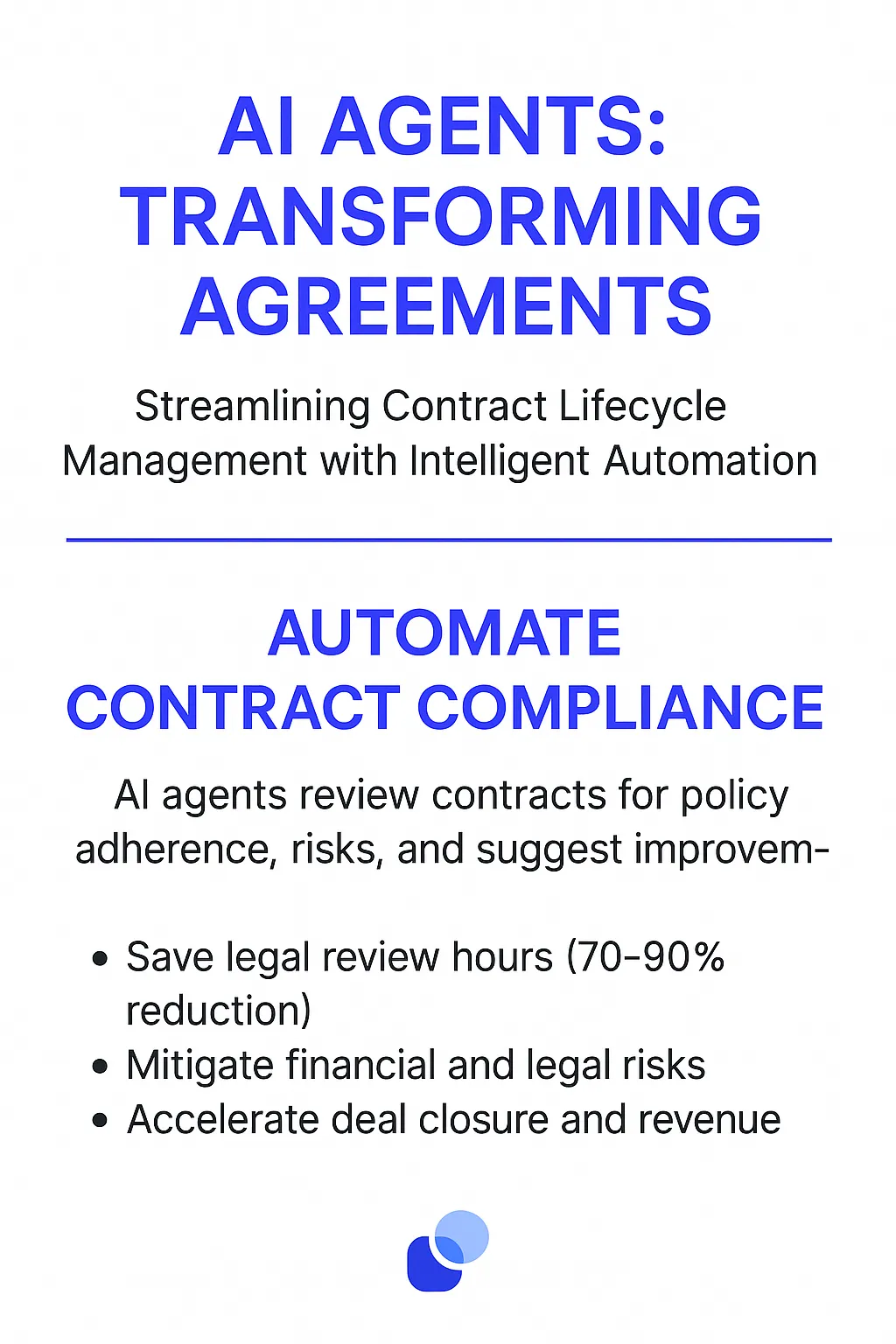Docusign AI Agents
Understanding DocuSign
DocuSign is the heavyweight champion of the digital signature world. It's not just a tool; it's a paradigm shift in how businesses handle agreements. At its core, DocuSign allows you to sign documents electronically, but that's like saying Facebook just lets you post status updates. The platform has evolved into a comprehensive system for preparing, signing, acting on, and managing agreements. It's the digital equivalent of a notary, lawyer, and file clerk rolled into one, minus the billable hours and paper cuts.
DocuSign's feature set is like a Swiss Army knife for document management. You've got your basic e-signature capabilities, sure, but that's just the tip of the iceberg. The platform offers template creation for frequently used documents, workflow automation to route agreements to the right people in the right order, and integration with other business tools like Salesforce and Google Drive. It's got robust security features to keep your John Hancock safe from digital pickpockets, and analytics to give you insights into your agreement processes. Plus, it's mobile-friendly, because let's face it, deals don't wait for you to get back to your desk.

Benefits of AI Agents for DocuSign
What would have been used before AI Agents?
Before AI agents entered the scene, DocuSign users were stuck in a world of manual document processing and tedious contract reviews. They'd spend hours poring over agreements, cross-referencing terms, and manually inputting data. It was like trying to build a skyscraper with a hammer and nails – possible, but painfully slow and prone to human error.
Teams relied on a combination of human expertise, basic automation tools, and a lot of coffee to get through their document workflows. But let's face it, even the most caffeinated legal eagle can't match the speed and accuracy of a well-trained AI.
What are the benefits of AI Agents?
Enter AI agents for DocuSign – the secret weapon that's transforming how we handle digital paperwork. These digital teammates are like having a tireless, hyper-intelligent intern who never sleeps and never complains about doing the grunt work.
First off, AI agents can blaze through document analysis at warp speed. They can extract key information, flag potential issues, and even suggest improvements to contract language. It's like having a legal savant on speed dial, but without the attitude or billable hours.
But speed isn't everything. The real game-changer is accuracy. AI agents don't get tired, they don't get distracted by office gossip, and they certainly don't make mistakes because they're thinking about what to have for lunch. They consistently apply the same level of scrutiny to every document, whether it's the first of the day or the thousandth.
Another killer feature? Personalization at scale. AI agents can learn your company's specific needs and preferences, tailoring their approach to each document. It's like having a custom-built document processing machine that gets smarter with every use.
Let's talk integration. These AI agents don't just play nice with DocuSign – they become an integral part of your entire document ecosystem. They can pull data from your CRM, cross-reference with your knowledge base, and even update your project management tools. It's like having a digital octopus, with tentacles reaching into every corner of your workflow.
Finally, there's the learning curve – or lack thereof. Unlike complex software that requires weeks of training, AI agents can be up and running in no time. They adapt to your processes, not the other way around. It's like hiring a new team member who already knows your business inside out.
In the end, AI agents for DocuSign aren't just tools – they're growth accelerators. They free up your team to focus on high-value tasks, reduce errors that could cost you big, and give you the kind of data-driven insights that can help you make smarter business decisions. It's not about replacing humans; it's about amplifying what humans do best. And in the high-stakes world of contracts and agreements, that's not just nice to have – it's a competitive necessity.

Potential Use Cases of AI Agents with DocuSign
Processes
DocuSign's bread and butter is streamlining document workflows, but throw AI agents into the mix, and you've got a whole new ballgame. These digital teammates can take DocuSign's capabilities to the next level, automating complex processes that traditionally required significant human oversight.
For starters, AI agents could revolutionize contract management. They'd analyze historical data, identify patterns in negotiations, and suggest optimal terms based on past successes. This isn't just about speed - it's about making smarter decisions that could significantly impact your bottom line.
Another killer process? Compliance checks. AI agents could scan documents in real-time, flagging potential issues before they become problems. They'd keep up with changing regulations across different jurisdictions, ensuring your documents are always on the right side of the law. This kind of proactive compliance management could save companies millions in potential fines and legal headaches.
Tasks
When it comes to specific tasks, AI agents paired with DocuSign could be game-changers. Think about document routing - a tedious, error-prone process when done manually. AI agents could analyze the content of each document, understand its purpose, and automatically route it to the right signatories in the correct order. No more bottlenecks caused by documents sitting in the wrong inbox.
Data extraction is another area ripe for AI intervention. These digital teammates could pull key information from signed documents - dates, amounts, party names - and automatically populate your CRM or accounting systems. This isn't just about saving time; it's about eliminating data entry errors that can cause major headaches down the line.
Let's not forget about personalization. AI agents could analyze past interactions and tailor document language to each specific client or partner. They'd learn which clauses certain parties tend to push back on, and proactively suggest alternatives. This level of customization could significantly speed up negotiations and improve close rates.
The potential here is massive. We're not just talking about incremental improvements - these AI-powered use cases could fundamentally reshape how businesses handle documents and agreements. Companies that embrace this tech early will have a significant competitive advantage. Those that don't? Well, they might find themselves left behind in the dust of the AI revolution.

Industry Use Cases
AI agents are reshaping the DocuSign landscape, offering tailored solutions across diverse sectors. These digital teammates aren't just add-ons; they're becoming integral to how businesses handle agreements and signatures. Let's dive into some real-world scenarios where AI is making waves in DocuSign processes:
Legal firms are leveraging AI to sift through complex contracts, flagging potential issues before they hit the signing stage. In healthcare, these agents are ensuring HIPAA compliance in patient consent forms, reducing liability risks. Real estate transactions are seeing faster turnarounds as AI pre-populates fields and validates information in purchase agreements.
But it's not just about speed - it's about precision and adaptability. In finance, AI agents are cross-referencing loan documents with ever-changing regulations, ensuring every 'i' is dotted and 't' is crossed. Tech startups are using AI to customize their NDAs on the fly, adapting to the unique needs of each potential partner or investor.
These aren't hypothetical use cases - they're happening now, quietly transforming how businesses operate. The AI revolution in DocuSign isn't loud; it's subtle, efficient, and increasingly indispensable. From legal contract review to compliance monitoring, AI agents are becoming the backbone of modern document workflows.
Real Estate: Closing Deals at Warp Speed with DocuSign AI
Let's talk about how DocuSign AI could flip the real estate industry on its head. We're not just talking about faster signatures here - we're looking at a complete overhaul of the property transaction process.
Picture a real estate agent, let's call her Sarah. She's juggling multiple clients, each at different stages of buying or selling. Enter the DocuSign AI agent, her new digital teammate.
This AI doesn't just send out contracts for signatures. It's actively managing the entire documentation flow. It's scanning through hundreds of pages of property records, zoning laws, and mortgage terms, flagging potential issues before they become deal-breakers.
But here's where it gets really interesting. The AI is learning from every transaction. It starts to recognize patterns in successful deals and potential red flags in ones that fall through. It's not just processing - it's predicting.
Sarah can now focus on what she does best - building relationships and closing deals. The AI handles the grunt work, like automatically populating contracts with the correct information, scheduling inspections, and even suggesting optimal times for open houses based on local traffic patterns and weather forecasts.
This isn't just about efficiency. It's about creating a new paradigm in real estate transactions. Buyers and sellers get a smoother, more transparent process. Agents like Sarah can handle more clients without sacrificing quality of service. And brokerages can scale their operations without proportionally increasing their back-office staff.
The ripple effects here are huge. Faster closings mean more liquidity in the real estate market. More accurate document processing means fewer legal disputes down the line. And the wealth of data generated could lead to more precise property valuations and risk assessments.
This is the kind of applied AI that doesn't just increment existing processes - it completely rewrites the rulebook. And that's the kind of disruption that creates billion-dollar opportunities.
Healthcare: DocuSign AI Redefining Patient Care and Compliance
The healthcare industry is ripe for disruption, and DocuSign AI is poised to be a game-changer. We're not talking about minor improvements here - this is about fundamentally transforming how healthcare providers manage patient documentation and regulatory compliance.
Consider Dr. Emily, an overworked physician at a bustling urban hospital. Her days are a blur of patient consultations, procedures, and endless paperwork. Now, introduce a DocuSign AI agent into her workflow.
This AI isn't just a glorified form-filler. It's a sophisticated system that understands the nuances of medical documentation and healthcare regulations. It's constantly updating its knowledge base with the latest medical research and regulatory changes, ensuring that every document it handles is compliant and up-to-date.
The AI agent can draft and customize informed consent forms in real-time, tailoring them to each patient's specific condition and proposed treatment. It can cross-reference patient records to flag potential drug interactions or contraindications, reducing the risk of medical errors.
But here's where it gets really interesting: the AI starts to identify patterns in patient care and outcomes. It can suggest optimized treatment protocols based on aggregated, anonymized data from thousands of similar cases. This isn't replacing clinical judgment - it's augmenting it with data-driven insights.
For hospital administrators, the impact is equally profound. The AI can manage the complex web of insurance authorizations, ensuring that every procedure is properly documented and billed. It can predict staffing needs based on historical patient flow data, optimizing resource allocation.
The implications for medical research are staggering. With proper privacy safeguards in place, this system could facilitate large-scale, real-time clinical studies, dramatically accelerating the pace of medical innovation.
This isn't just about making healthcare more efficient - it's about creating a new paradigm of patient care. One where doctors spend more time with patients and less time on paperwork. Where treatment decisions are informed by real-time, data-driven insights. Where administrative overhead is drastically reduced, potentially lowering healthcare costs.
The healthcare industry is notoriously resistant to change, but the potential benefits here are too significant to ignore. We're looking at a future where AI doesn't just support healthcare - it becomes an integral part of delivering better patient outcomes. From healthcare compliance to patient care optimization, AI agents are transforming the medical landscape. And that's the kind of transformation that creates massive opportunities for both entrepreneurs and investors.
Considerations and Challenges for Docusign AI Agent Implementation
Implementing a Docusign AI agent isn't just about plugging in some fancy tech and calling it a day. It's a complex dance of technical prowess, operational finesse, and a dash of foresight. Let's dive into the nitty-gritty.
Technical Challenges
First up, we're talking about integration headaches. Your Docusign AI agent needs to play nice with existing systems, and that's no small feat. You're looking at API integration issues, data format discrepancies, and the ever-present specter of legacy system constraints.
Then there's the data privacy tightrope walk. We're dealing with sensitive documents here, folks. Your AI agent needs fort knox-level security measures, end-to-end encryption, and compliance with a alphabet soup of regulations (GDPR, CCPA, you name it).
Let's not forget about scalability. Your AI agent might handle a few documents swimmingly today, but what happens when you're processing thousands per hour? You need an architecture that can grow with your needs without breaking a sweat.
Operational Challenges
On the operational front, user adoption is your first hurdle. Your team might be used to the old way of doing things. Introducing an AI agent into the mix? That's going to ruffle some feathers. You need a solid change management strategy and user training program to smooth those ruffled feathers.
Then there's the question of oversight. Who's keeping an eye on your digital teammate? You need clear protocols for monitoring the AI's performance, handling exceptions, and ensuring the human touch when necessary.
Lastly, let's talk about the elephant in the room: cost. Implementing an AI agent isn't cheap. You're looking at initial development costs, ongoing maintenance, potential licensing fees, and the hidden costs of team training and productivity dips during the transition period.
Navigating these challenges isn't for the faint of heart. But get it right, and you're looking at a game-changing boost in efficiency and accuracy in your document processes. It's a classic high risk, high reward scenario - the kind that separates the wheat from the chaff in the tech world.
The Intelligent Future of Digital Agreements
The marriage of DocuSign and AI agents isn't just an incremental improvement - it's a quantum leap in how we handle digital agreements. We're looking at a future where contracts practically negotiate themselves, compliance is a given rather than a headache, and human error in document processing becomes as rare as a floppy disk. But this isn't a plug-and-play solution. It requires careful navigation of technical and operational challenges, from data privacy concerns to user adoption hurdles. The companies that get this right won't just be more efficient - they'll be playing an entirely different game. As we stand on the brink of this AI-powered revolution in document management, one thing is clear: the future of agreements is not just digital, it's intelligent. And those who fail to adapt may find themselves on the wrong side of the dotted line. This transformation represents a fundamental shift toward digital transformation that will reshape entire industries.













